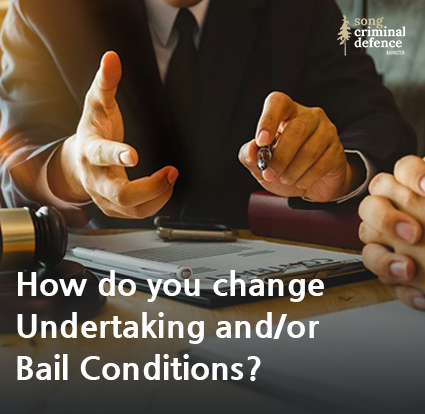Song Criminal Defence
Frequently Asked Questions (FAQs)
Q: How do you change Undertaking and/or Bail Conditions

How can I get my undertaking or bail conditions changed so I can speak with my partner and/or go home?
Upon release from a police detachment by signing a police undertaking or from jail on a bail recognizance, an accused person is given conditions or rules to follow. In certain cases, an accused person may require changes to be made to these conditions. These changes are made by way of an application with links to each respective form as follows:
- Application for Consent Variation of Police Undertaking COVID-19-OCJ-Consent-Variation-Police-Undertaking-EN.pdf (https://www.ontariocourts.ca/ocj/files/forms/COVID-19-OCJ-Consent-Variation-Police-Undertaking-EN.pdf)
- Application for Consent Variation of Bail COVID-19-OCJ-Consent-Bail-Variation-EN.pdf (https://www.ontariocourts.ca/ocj/files/forms/COVID-19-OCJ-Consent-Bail-Variation-EN.pdf)
What are the differences in procedure in varying a police undertaking and a bail recognizance?
A police undertaking is a "promise" made by the accused upon signing the undertaking form before being released from the police detachment. The officer in charge or the Sergeant on duty has determined the accused person to be releasable into the community. The undertaking contains conditions or rules the accused person must abide by upon release. Breaking any of the conditions will result in the accused being arrested and charged with breach of undertaking.
A bail recognizance is also a "promise" made by the accused upon signing the bail recognizance after being granted bail by way of a bail hearing in Court. The officer in charge or the Sergeant on duty has determine the accused person to not be releaseable into the community initially; thereby, taking the accused to Court for a bail hearing. For more on bail hearings and the procedure involved, see our section on bail hearings. The bail recognizance also contains conditions or rules the accused person must abide by upon release. Breaking any of the conditions will result in the accused person being arrested and charged with failure to comply with bail recognizance.
Breaching either an undertaking or a bail recognizance is considered as a serious offence by the Court. However, a Crown Attorney may consider breaching conditions of a bail recognizance to be more serious than breaching an undertaking as the conditions within a bail recognizance constitute an order of the Court.
What is the process involved in varying the conditions of a undertaking or recognizance?
Let's use an example: An accused person is charged with Assault which is domestic in nature. Let's say the couple has two children together. Assume the police undertaking or the bail recognizance restricts contact and attendance between the accused and the complainant. However, the conditions are silent on custody and access matters regarding the shared children. Provided the children were not involved in the facts of the matter, the accused person should be entitled to see his or her children pending a review from the Children's Aid Society. Obviously, the accused would seek a variation to add a condition that would allow him or her to see the children.
What is involved in changing or varying undertaking and/or bail conditions?
- Retained counsel should be made aware of the issue regarding a particular undertaking and/or bail condition and the reasons for why the condition(s) need to be changed.
- In most cases, retained counsel and the Assistant Crown Attorney with carriage over the matter should ideally have a copy of the disclosure (For more information on what disclosure is, see the FAQ article on bail conditions). Having this information will allow all parties to know what is being alleged and the seriousness of the allegations which will help frame how both parties may respond to requests for changing certain undertaking or bail conditions.
- A Crown Pretrial should be scheduled and conducted between the Crown and the Defence. A Crown Pretrial is an informal meeting between the Crown Attorney and the Defence set on a particular date and time. The Defence and the Crown would meet to discuss what variations are being proposed and the reasons why these variations may be required. The Crown may either agree or disagree with the proposed variations.
- If the Crown agrees to the proposed variation, either the Crown or the Defence will fill out the form listed earlier in this FAQ. Notice there are differences in procedure for varying a police undertaking and a bail recognizance as follows:
- Police Undertaking: The Crown is the only individual that needs to agree to the variation in order for the variation to be made. On the variation form, the Crown and the accused person would sign.
- Bail Recognizance: The Crown and a Justice of the Peace, the Accused and a surety must agree to a variation in order for the variation to be made. The Accused, the Crown, a Justice of the Peace, and the surety (if one is present) need to sign the variation.
Please give us a call at (647) 778-0031 as we are more than happy to speak to you about becoming a surety or any other questions you may have. There's no charge or obligation to hire when you reach out to us. You can also reach out to us by email at elliot@songcriminaldefence.com if that's more convenient for you.
